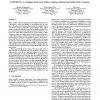Free Online Productivity Tools
i2Speak
i2Symbol
i2OCR
iTex2Img
iWeb2Print
iWeb2Shot
i2Type
iPdf2Split
iPdf2Merge
i2Bopomofo
i2Arabic
i2Style
i2Image
i2PDF
iLatex2Rtf
Sci2ools
125
click to vote
IOPADS
1996
1996
ENWRICH a Compute-Processor Write Caching Scheme for Parallel File Systems
Many parallel scientific applications need high-performance I/O. Unfortunately, end-to-end parallel-I/O performance has not been able to keep up with substantial improvements in parallel-I/O hardware because of poor parallel file-system software. Many radical changes, both at the interface level and the implementation level, have recently been proposed. One such proposed interface is collective I/O, which allows parallel jobs to request transfer of large contiguous objects in a single request, thereby preserving useful semantic information that would otherwise be lost if the transfer were expressed as per-processor non-contiguous requests. Kotz has proposed disk-directed I/O as an efficient implementation technique for collective-I/O operations, where the compute processors make a single collective data-transfer request, and the I/O processors thereafter take full control of the actual data transfer, exploiting their detailed knowledge of the disk layout to attain substantially improv...
| Added | 02 Nov 2010 |
| Updated | 02 Nov 2010 |
| Type | Conference |
| Year | 1996 |
| Where | IOPADS |
| Authors | Apratim Purakayastha, Carla Schlatter Ellis, David Kotz |
Comments (0)

